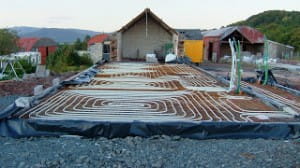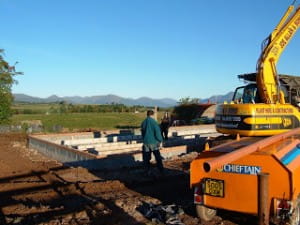Hen House Happenings
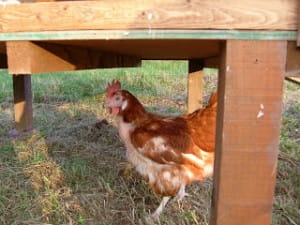
The hens have flourished in the past week. Their egglaying is quite haphazard, some are using the nesting boxes, others are more random. Some days we get several eggs, some days one or two. We've probably had around 25 eggs in the last week. In the past few days we've kept them in the henhouse for longer periods as, apparently, that is how they learn where to head for at dusk. Hens, especially battery ones, have to learn 'stranger danger' ie to keep out of the reach of foxes at night. This evening only 2 needed lifting into the house whereas last week we were chasing the little devils around their enclosure (immensely hilarious if anyone was watching!). Rather bizarrely they crowd into the 3 nesting boxes, this evening 8 of them were squashed into the 3 small boxes.
Chooks
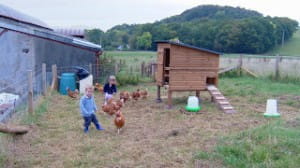
Our chickens have arrived! On Saturday we took ownership of 10 rescue hens from the Battery Hen Welfare Trust and they seem to be settling in well. The charity essentially comes to an arrangement with a battery egg producer to rehome hens which have reached the end of their maximum production cycle. They still have plenty of eggs to lay (the breed is Isa Brown which is a hybrid known for good egg production) and in our first 2 days we've had 10 eggs from them. Before too long we'll be selling them locally.
The hens have had 2 sunny days to get used to the big wide world, what a contrast to their previous living conditions. Some are distinctly more adventurous than others and are exploring their new environment, so far they have not ventured very far from one corner of the enclosed area. The children are throughly enjoying their new responsibilities and helping with looking after our new pets.On the building site - the men have finished laying the surface and rainwater run-offs into the lower field and the main house related activity is placing the 200mm of Jablite 70 polystyrene insulation board which is one of the key elements in keeping the house warm from the ground up. The sun is bouncing off the brilliant white polystyrene, its quite dazzling. Hopefully tomorrow the underfloor heating team arrive to attach the pipe circuits to the grid.
Day 11...
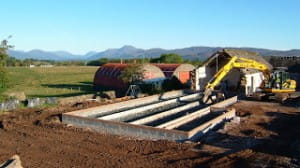
Since Debs' post this morning, by the time the crew left at the end of the working day the hardcore and type 1 material was in with sand blinding on top ready for the insulation to be installed. This point marks the first departure from conventionality, as the next stage is to install 200mm of polystyrene insulation ready for the 20 tonnes of concrete slab to be poured on top of it.
Usual practice is to pour the slab at this stage, then insulate it and pour 50-70mm of screed on top within which the underfloor heating pipes are installed. We're cutting out the screed and going for a single pour of 150mm, which will will also contain the underfloor heating pipes within this massive slab.
Chilly Morning
Last night we had our first true frost. The air temp hit freezing outside the caravan and the lowest point inside was 4.8 deg C -the hard part is surfacing from under the duvet. The views are fabulous today, its very easy to see where the big windows of the house will look out to.
Drainage
Work today is concentrating on getting the drainage in place, notably for surface and rain water as the foul drainage is already in place from the edge of the previous house to the septic tank.
Day 3
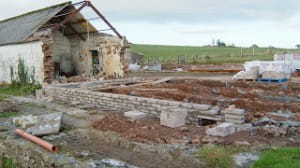 With concrete founds set and sight lines re-established, work starts on the dwarf walls which will support the slab. We had good dry weather today and good progress was made.
With concrete founds set and sight lines re-established, work starts on the dwarf walls which will support the slab. We had good dry weather today and good progress was made.
Construction starts....Days 1-2
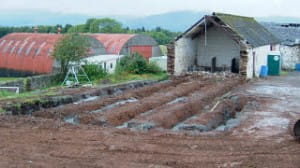
Almost a year after taking posession of the site, our builder and crew arrive last Friday to start setting out. Over the weekend an excavator is delivered, and by the end of today - Tuesday -the foundation trenches have been dug and reinforced concrete footings laid. This marks a rapid start to a seemingly long design and planning process!It is also a year since we joined the Association for Environment Conscious Builders, a voluntary organisation pressing for higher sustainability standards in the design, building and operation of new buildings. A particular focus of the AECB is to push for higher standards of energy efficiency in new and exisiting buildings, now also a priority for the UK Government to be implemented through its Code fo Sustainable Homes.
As part of our design brief the house has been specified to meet the AECB's low energy 'Silver Standard' which calls for a 70% redution in energy use over a modern home built to current regulations, and is roughly equivalent to CSH Level 4. This is to be achieved through designing in high levels of insulation and airtightness, and considering the orientation of the building on the site to maximise solar gain in winter whilst avoiding the possiblity of overheating in summer. In the coming months we will describe in more detail how these aspects will be implemented.
Search and book
Tags
animals architectural design awards, cottages, sustainability bees caravan cottages Curlew Cottage days out design dogs eastcambusmoon electric vehicles foundation fruit and veg production furniture gold award great review green toursim hard landscaping heat pump heat recovery hens holiday accommodation insulation interiors lambing landscaping loch lomond low energy measures national park nature outings owls people photoshoot roof solar PV timber frame Training ventilation walks website windows
Blog archive
- June 2019 (1 entry)
- February 2019 (1 entry)
- December 2018 (1 entry)
- November 2018 (1 entry)
- April 2018 (1 entry)
- December 2017 (1 entry)
- October 2017 (2 entries)
- June 2017 (1 entry)
- April 2017 (2 entries)
- March 2017 (1 entry)
- February 2017 (1 entry)
- February 2016 (1 entry)
- June 2014 (1 entry)
- June 2013 (1 entry)
- April 2013 (1 entry)
- February 2013 (1 entry)
- May 2012 (2 entries)
- April 2012 (1 entry)
- March 2012 (2 entries)
- December 2011 (1 entry)
- August 2011 (2 entries)
- June 2011 (4 entries)
- May 2011 (4 entries)
- April 2011 (1 entry)
- December 2010 (4 entries)
- October 2010 (2 entries)
- August 2010 (2 entries)
- December 2009 (1 entry)
- November 2009 (2 entries)
- October 2009 (2 entries)
- September 2009 (3 entries)
- August 2009 (1 entry)
- July 2009 (2 entries)
- June 2009 (3 entries)
- May 2009 (7 entries)
- April 2009 (2 entries)
- March 2009 (2 entries)
- February 2009 (1 entry)
- January 2009 (4 entries)
- December 2008 (2 entries)
- November 2008 (1 entry)
- June 2008 (5 entries)
- May 2008 (4 entries)
- April 2008 (11 entries)
- March 2008 (14 entries)
- February 2008 (9 entries)
- January 2008 (12 entries)
- December 2007 (11 entries)
- November 2007 (11 entries)
- October 2007 (10 entries)
- September 2007 (6 entries)
